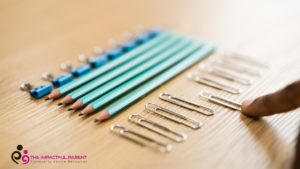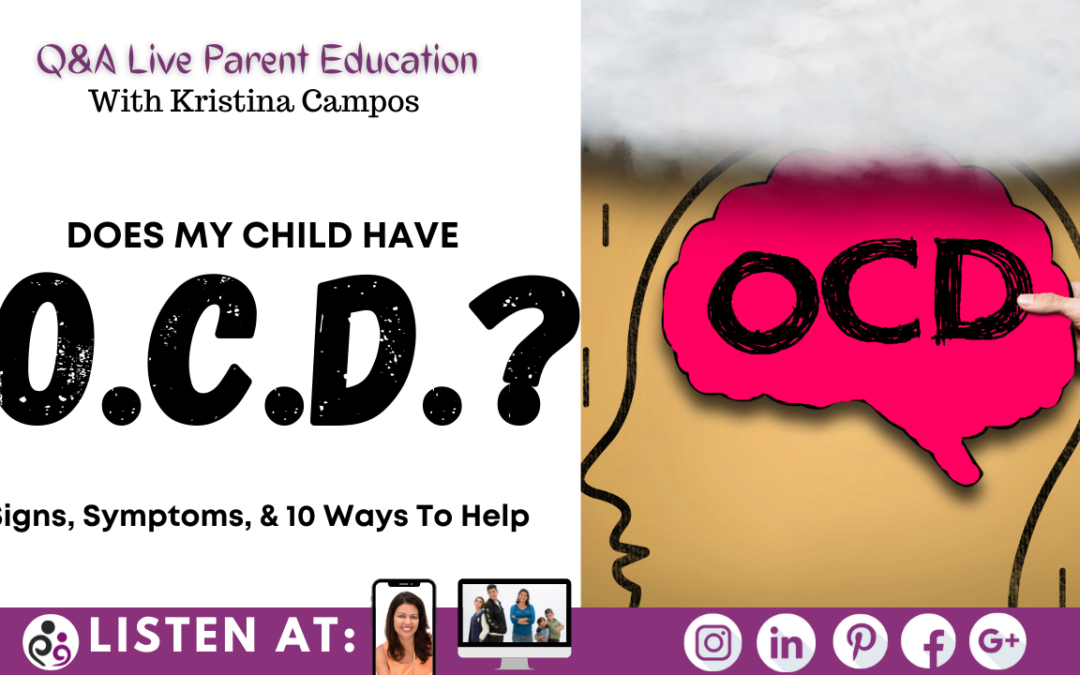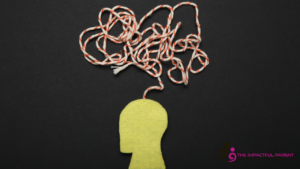Does my child have OCD? How will I know and how can I help my child? Kristina Campos, the founder of The Impactful Parent, talks to parents about the signs of OCD, causes of OCD, and gives 10 tips for supporting kids with obsessive-compulsive disorder.
Watch the Video below
LINKS MENTIONED IN THE RECORDING
Does my child have OCD?
https://theimpactfulparent.com for more FREE Resources and paid programs.
https://theimpactfulparent.passion.io/
https://apps.apple.com/app/impactful-parent/id1601274505
https://play.google.com/store/apps/details?id=com.prmto733iicm.ptt70cx5app
to download the FREE Impactful Parent App. Freebies included.
TRANSCRIPT
Does my child have OCD?
Welcome Impactful Parents. Today, we will talk about Obsessive-Compulsive Disorder in your school-aged child.

Does my child have OCD?
Hello, my name is Kristina Campos. I am the founder of the Impactful Parent. Every week I come on and answer one of your questions LIVE. If you have a question for next week, please submit it at theimpactfulparent@gmail.com or by messaging me on social media. All submissions are kept anonymous.
Today’s question reads: I think my child has OCD. How can I tell if she does and if so, how can I help my child develop more habits that are causing time and distress?
Thank you for submitting this question! Today we will talk about OCD, what it looks like in our children, and how we can support our kids that have this disorder- and stick around to the end because I am giving you 10 tips for helping your child so you can be a more impactful parent. Let’s get started!
Obsessive-Compulsive Disorder, or OCD for short, is a mental health disorder when a person gets caught in a cycle of obsessive and compulsive habits. Your child might exhibit recurrent thoughts, persistent urges, and impulsive behaviors. These behaviors and thoughts might be intrusive and unwanted, plus you might be seeing your child with increased anxiety and distress.
OCD Compulsions are the repetitive behaviors you might see as a parent. This might look like hand washing all the time, touching items in unusual ways, arranging things over and over, repeating words, phrases, or questions over and over, having trouble making choices, and having trouble doing a simple task that they should be able to do like getting dressed, and counting items obsessively, and checking if things are OK repeatedly.
If any of this sounds familiar, your child might have OCD.
Why would children develop Obsessive-Compulsive Symptoms? The causes of OCD are actually unknown, but we doctors know that OCD is a way of coping with stress, anxiety, and trauma. Compulsions are behaviors a child will do, trying to feel better. To the child, rituals are comforting and relieve stress. Compulsions are a way to keep bad things from happening and reduces their anxiety or distress. Just keep in mind that these compulsions are not voluntary. The actions and thoughts these kids are having are involuntary. They can’t control it. And keep in mind that compulsions, more often than not, are a result of certain obsessions, so let’s talk about that now.
OCD Obsessions: are what the child seems to be obsessed about. Parents may see their children obsessed with certain fears/worries. What does this look like in the home? Well, it could look like your child being overly upset about germs, dirt, and feelings of needing things clean. It could look like your child needs to have control of the situation or their environment. Some kids show obsessions with needing order and predictability. Other kids will get extensively worried about someone they love getting sick, hurt, or dying. Obsessions vary per person; therefore, OCD also looks different in every person. This is why it may be difficult to self-diagnose OCD without a medical professional. Overall, no matter what your child’s obsession might be, kids with OCD will seem anxious, worried, irritable, easily frustrated, easily saddened, upset when they can’t do a ritual, and will often seek constant reassurance from a parent that things are OK. These feelings, obsessions, and compulsions are exhausting for the child and the family.

Does my child have OCD?
Again, the causes for OCD are unknown; however, doctors have narrowed down the probability of why someone might get OCD down to 4 reasons:
- Biology: There could be a problem with the person’s brain communicating correct information to other parts of the brain.
- Genetics: OCD runs in families
- Learned Experiences: This means that the person had a painful childhood experience, trauma, abuse, or was bullied, and those experiences created the OCD as a coping tool. The OCD is a way for the child to feel more in control and assured that the traumatic experience won’t be repeated.
- And lastly, OCD could be a result of Pediatric Autoimmune Neuropsychiatric Disorders Associated with Streptococcal infections.
Either way, statistics show that 1 in every 40 adults and 1 in every 100 children in the United States have OCD.
What can parents do if they think their child has OCD? How can you support an OCD child? Here are 6 suggestions.
- First, be sure not to self-diagnose OCD. Take your child to a medical professional to clarify whether or not you are actually dealing with OCD.
- Become educated about OCD and what this conditional entails. Talk with your doctor about possible medications that could help lower your child’s anxiety and if that kind of help is appropriate for your family’s situation.
- Get your child into therapy. Cognitive Behavior Therapy is the most popular talk therapy used to treat OCD obsessions and compulsions.
- Teach your child other coping skills, relaxation techniques, and stress management strategies.
- Encourage and help your child get good sleep and live a healthy lifestyle. Diet, sleep patterns, stress management, self-care, and other healthy living strategies can affect how your child perceives the world and how well they can manage their anxiety. These skills are not intuitive. Parents need to lead a healthy living example and teach their children healthy living options.
- Understand that some kids may not let their parents know about their fears and causes of their OCD. Some children will only feel confused or ashamed about their fears. These kids may keep their trauma to themselves. They may also hide their OCD and compulsions. These kids still need their parent’s help and support, and it will be even more important for these children to get a therapist to talk to.
Does my child have OCD?
- Parents can help children with OCD by making their children’s lives as predictable as possible. Predictability reduces anxiety and fears of the unknown. The best way parents can create predictability is to provide their children with a regular, consistent, and strong routine.
- Talk to your children about their OCD and don’t accommodate everything around their illness. Give them encouragement and reassurance that many kids need to feel safe, but giving in to unreasonable demands may also be a disservice. Talk to a health care professional about where the boundaries for help versus enabling might be for your family.
- Find support groups in your area for OCD. Support groups for parents and their children are available.
- Discover more from the OCD Foundation. You can find out more about OCD and this organization online at https://iocdf.org/. This website can be a great resource for families!
Thank you for watching this video today.
If you have a question you want to submit for me to answer live, please do! Submit your questions by DM or email at theimpactfulparent@gmail.com. Plus- if you want to become a more Impactful Parent, check out all that my website has to offer! I have parenting courses, family coaching, a free downloadable app, and lots of free resources. But until next time, you got this, parents. I am just here to help.
-
What to do next:
1. Get The Impactful Parent App! Everything you need in your parenting journey in one spot! Available on the Android Play Store and the Apple Store. Search Impactful Parent (direct links listed above under Links in Episode).
2. Follow The Impactful Parent on social media if you don’t already! Facebook, Instagram, LinkedIn, & Pinterest
4. Check out the official website of The Impactful Parent for FREE RESOURCES, parenting classes, mom’s groups, and so much more! Click here to check it out!
5. Discover how you can work with Kristina! Sign up for a FREE 30-minute discovery call! Click here to find a time that works best for you!
Bottom Line… I am here for YOU! Contact me at theimpactfulparent@gmail.com
It takes a lot to run a household! Here are a few products I USE and recommend:
Gabb Wireless: The BEST first phone for your child!
- No internet, no social media, and NO WORRIES! This phone has GPS tracking and other features that parents want to have peace of mind about their child having a phone. The Gabb Wireless phone has the sleek look of a smartphone that kids love without worry and high price. To find out more and order your phone (or watch) go to: gabbwireless.com/promo/IMPACTFULPARENT30


